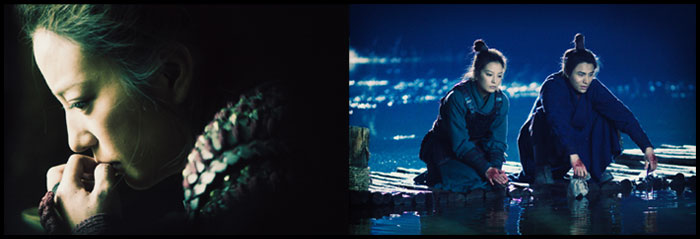| A review of Mulan |

|

|

|
| Culture | |
| Sunday, 27 June 2010 | |
|
To retell a famous ancient legend such that it suits the taste of a modern audience is difficult. To show it to the world as a reflection of an important aspect of Chinese culture is even more so. The 1998 Disney version of Mulan made this Chinese legend well known in the western world, but it really is the 2009 film directed by Jingle Ma that gave depth to the complex emotions of such a heroine who embodies a type of courage highly celebrated throughout China’s history and continues to drive its society forward.
The story of Mulan takes place in 450AD when the land of the Wei people was attacked by the Rouran, who survive by constantly robbing the Wei. Every Wei family had to send a man to war, but Mulan (Vicky Zhao) decided to secretly go on behalf of her old and ill father.
Mulan’s talent and dedication on the battlefield singled her out and eventually made her become a general. But being a girl she is nevertheless particularly vulnerable, and her vulnerability often creates the most emotionally powerful scenes. On one occasion, when the commander searched for a lost gem, he asked everyone to undress, and Mulan was forced to take the blame for thief. Facing imminent death, Mulan’s concern was not for her own life, but the disappointment that her father would feel knowing that she did not die as a respectable warrior. The heart-wrecking way she cried by hiding her face behind a large bowl as she drank soup from it is a perfect reflection of her dual identity. On the one hand, the femininity that she tries but fails to hide is presented by the sound of her cry, made more effective because her face could not be seen. But on the other hand, the motif of shedding tears into the wine bowl that one drinks from has been repeatedly used when warriors face possible deaths that it has evolved to conventionally signify a powerful aspect of masculinity.
The 400 word ancient Chinese poem that versions after versions of Mulan films are made from actually did not contain a romantic subplot. But for the modern theatre-goers, films about war and battle can hardly omit romance. In the Disney adaptation, Mulan and the commander developed a strong brotherhood bond throughout the film, and the possible romantic ending between the two was only explicitly hinted at in the last few scenes.
But this is not the romantic plot that Jingle Ma has chosen for his heroine. He explained in the film’s special features: “I want to show less of male bonding and more of romance, otherwise it is easy to give the false impression of homosexual love.” The female identity of Mulan was discovered by Wentai (Kun Chen) before the battle even begun. Indeed, Wentai’s love towards her has gone through a complex development. It was out of sympathy for a woman who performed her filial duty that he first helped her to escape from the prison. It was out of admiration for her skills and courage that he helped her to grow into a good leader who can fight alongside him. This friendship finally became a romantic love that was destined to have no happy ending because the identity that Mulan casted herself into allowed her no room for love.
The point that this became clear was presented in a powerful if not slightly cliché scene where Mulan irrationally left her army to help Wentai upon hearing that he was under attack and consequently witnessed the death of many warriors in her own army. When scolded by Wentai, she asked if he would have done the same for her. Facing away from her, he said “no” while suppressing the tears that rolled down his cheeks. Effective use of music, silence and facial expressions made this scene a powerful presentation of the subordination of the individual’s emotion to one’s patriotic duty to a country - another reason that Mulan is so highly celebrated in Chinese culture.
Battle scenes, with so many warriors and horses, created an overwhelming atmosphere that effectively conveyed to the viewers the lack of individual freedom in war. The extremely harsh environment of Yinchuan Desert and Yellow River Stone Forest contrasted sharply with the serene villages that were the warriors’ homes and played an essential role in presenting the warriors’ homesickness.
One of the reasons that Jingle Ma managed to capture many impeccable shots is because he started his career as a photographer. Some of the powerful scenes were dominated by his creative use of visuals alone. An example is a close shot using Mulan’s eye as a mirror to show the death, injury and fighting that she has witnessed. Many great visuals are also accompanied by music – which is predominantly North-western Chinese, featuring many instruments popular in ancient China, like long horn and horse-head qin.
The weight of Chinese culture behind the story of Mulan seems to have encouraged the cast to perform to their utmost potential. Vicky Zhao’s acting demonstrated a delicate balance between Mulan’s vulnerability and strength. Although her feminine face and voice may have seemed like unconvincing disguises, they made her character more effective because while watching Mulan’s continual physical achievements, the audience is visually reminded of her identity throughout.
Kun Chen’s performance of Wentai fulfilled the most important requirement of the role – that he had to be strong and persistent to contrast the emotional Mulan. Because Mulan is the protagonist, Wentai would have had little contribution to the plot unless he is tough himself and shapes Mulan into the heroine that she becomes.
Mudo (by Jun Hu), the leader of the Rouran, is Mulan’s foil and is just as insightfully characterised. The context of the story has made him doubtlessly evil, but he is not just the villain. As the prince of the Rouran, he kills his father because his talent, confidence and ambition dictated him to fight for a better life for his people and destroy any obstacles that come in his way. Jun understood this role extremely well. One particularly memorable scene showing this ruthless ruler at work – he smashed a disobedient follower to death using a wine cup as opposed to killing him with a sword or knife - is in fact his idea.
Wei Xiaohu (by Jaycee Chan, son of martial arts legend Jackie Chan) is a carefree boy who grew into a mature man and eventually dies the death of a noble warrior. He provides much essential comic relief to this rather serious film.
Although compared by many to Red Cliff, Mulan is much more sentimental. The battle scenes only serve as background to the joy, sorrow, anguish and love of Mulan. Some dialogues are slightly cliché, but the popularity of the Mulan story ensured the film’s great reception in China. A commercial film that aims to highlight the cruelty of war, Mulan nevertheless powerful and inspiring.
Cecily Liu
Mulan (2009)
Directed by: Jingle Ma Produced by: Guangcheng Song Written by: Zhang Ting Starring: Vicky Zhao, Kun Chen, Jun Hu, Jaycee Chan, Nicky Lee, Vitas Music by: Siu Ho, Zhang Yadong, Li Si Yong, Li Weicong, Yi Jiayang Cinematography: Tony Cheung Editing by: Kwong Chi Leung Released in UK: June 21, 2010 (DVD)
Running time 113 minutes Language: Mandarin Subtitle: English For more information on the DVD release please visit:
http://www.dimsum.co.uk/whats-on/mulan---dvd-and-blu-ray-release.html |
|








